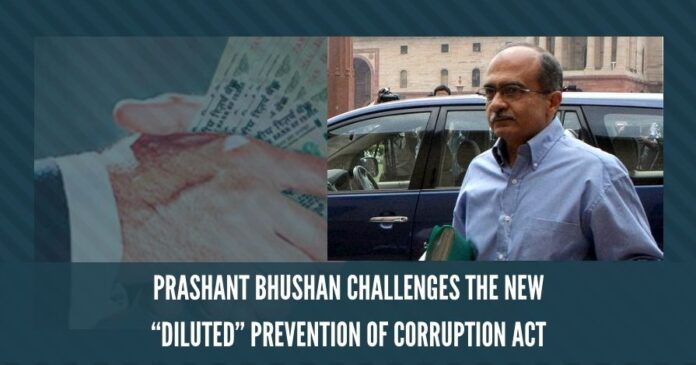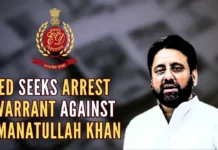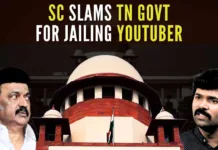
Activist Prashant Bhushan challenged the constitutional validity of the provision in the new Prevention of Corruption Act.
The Supreme Court on Monday sought the Centre’s response on the plea filed by noted lawyer and activist Prashant Bhushan challenging the constitutional validity of the provision in the new Prevention of Corruption Act which mandates prior sanction for starting a probe against a government official in a corruption case. This new provision is widely considered as a big hurdle by many investigators in the probe against corrupt officers, who are close to Government in power.
The petition claimed that obtaining of prior sanction to commence investigation introduced a period of delay during which vital evidence can be manipulated or destroyed.
The bench comprising Chief Justice Ranjan Gogoi and Justice Ajay Rastogi issued a notice to the Centre on the PIL filed by NGO ‘Centre for Public Interest Litigation’ (CPIL), mainly led by Prashant Bhushan against the validity of amended section 17A (1) of the Prevention of Corruption Act. Bhushan, representing the NGO, said the amended provision makes the prior sanction of appointing authority essential to launch an investigation against government servants in corruption cases.
“We think that you are entitled to a hearing and so we have issued the notice,” the bench said. The petition said that the amended section curtailed investigation against corrupt officials at the threshold and it was the third attempt by the government to introduce a provision which had already been held un-constitutional twice by the apex court. It has said that according to the amended Act, prior sanction for enquiry or investigation is required only where the alleged offence by a public servant is relatable to any recommendation made or decision taken by such public servant in discharge of his official functions or duties.
“It would be extremely difficult for the police to determine whether a complaint about an alleged offence is relatable to any recommendation made or decision taken by a public servant, especially as even an enquiry cannot be made without prior sanction,” argued Bhushan.
“The impugned amendments have rendered the PC Act almost ineffective by completely diluting the scope of some of the original provisions, by deleting some of the earlier offences and also by introducing a new provision, which in effect would protect corrupt officials and exponentially increase the level of corruption,” he said.
The petition further claimed that obtaining of prior sanction to commence investigation not only took away the element of secrecy and surprise but introduced a period of delay during which vital evidence can be manipulated or destroyed and gave time to the accused to lobby by employing various means for denial of permission.
The plea also claimed that the ease of fund transfers, offshore banking, lack of financial intelligence or informers, front companies, “Benami” make it extremely difficult to trace a money trail indicating bribes were paid.
“The seeking of permission in itself becomes a cause for corruption as it introduces yet another discretion, at the crucial stage of commencement of the investigation. Often this discretion of granting permission has conflicts of interest as the matter is referred to the very same department in which the corruption took place,” it said.
The plea also challenged the constitutional validity of section 13 (1) (d) (ii) (criminal misconduct) of PC Act, which made it an offence for a public servant to abuse his position and obtain for himself or any other person any valuable thing or pecuniary advantage by abuse of office.
“This particular provision was resorted to by the CBI while filing charge sheet in every high-profile mega corruption case. While it was important that the person involved was charged or convicted but it was far more important that, the deal/largesse was set aside and the loss to the exchequer reversed in these mega scam cases involving loss to exchequer of more than lac crores as was the case in the spectrum allotment and coal and iron ore mine allotment cases,” it said.
The plea also claimed that the ease of fund transfers, offshore banking, lack of financial intelligence or informers, front companies, “Benami” make it extremely difficult to trace a money trail indicating bribes were paid.
Former CBI Director, pointed out that the new act has really taken out the power of investigation agencies.
It alleged that due to the lapse of time between the payment of bribes and commencement of investigations, the bribes are converted into other assets or stashed away in safe havens.
“Besides, for a public servant, payment of bribes from the private party may not always be considerations, many times they abuse their positions in order to seek favours in promotion and posting, post-retirement benefits from their superiors,” it said.
The plea has said that section 13(1)(d) acted as a protection against non-traceability of the bribe, accepting favours other than the bribe and prevented wasting valuable resources in tracing a bribe.
Many officers in investigation agencies have observed that the new Prevention of Corruption Act has totally diluted the spirit of the act. Seeking prior clearance against an official involved in corruption will definitely lead to the collapse of the case. “If a Minister is involved in corruption, that Minister is not at all going to give approval probe against corrupt officials working under him,” said a former CBI Director, pointing out that the new act has really taken out the power of investigation agencies.
- Elon Musk postpones India visit. Non-clarity in Tesla partner and Starlink license might be the reasons - April 20, 2024
- NIA confiscates Pak-harboured Khalistani terrorist Lakhbir Singh Rode’s key aide’s land in Moga - April 19, 2024
- Prime Minister Narendra Modi: A Gujju businessman who does not invest his precious time for a losing battle - April 13, 2024











Na Khawoonga Na Khane Doonga.
Another Jumla
I endorse the three views of all the three readers. Dilution of PCA is not unlike put stamp of approval on the corrupt activities of the chosen few or turning a blind eye to an attack on the country by the enemies. Moreover, this is not in sync with the pre-poll promise of rooting out corruption from the country.
Though I dont have good opinion on Prashant Bhushan, the points indicated by him are very crucial and undeniable. No case can be proved by investigative teams with such rules. Do not know how such rules were framed in Modi gov. The pivotal reason for such law is to stop witch hunting or scare the gov employees from taking decisions does not stand a chance when compared with, this law allowing escaping route for corrupt employees.
Why Modi Govt diluted Prevention of Corruption Act? The present new Act is a big hurdle for CBI. Good that Prashant Bhushan took up the case. This shows that Narendra Modi is ill advised by Arun Jaitley, who always preaches for dilution of PC Act and tightening Sanction for Prosecution procedures. This Jai Italy is a burden for this Government. Modi has to suffer for taking this people rejected man in Cabinet
The person, who advised DoPT to enact these amendments in 2018 in the Prevention of Corruption Act, MUST be probed first and what was his motive by diluting the investigation process. Certainly, this will open the flood gates for all and sundry to loot the Country left and right and escape scrutiny. I wish Prashant Bhushan’s efforts on the above case succeeds in the Supreme Court.